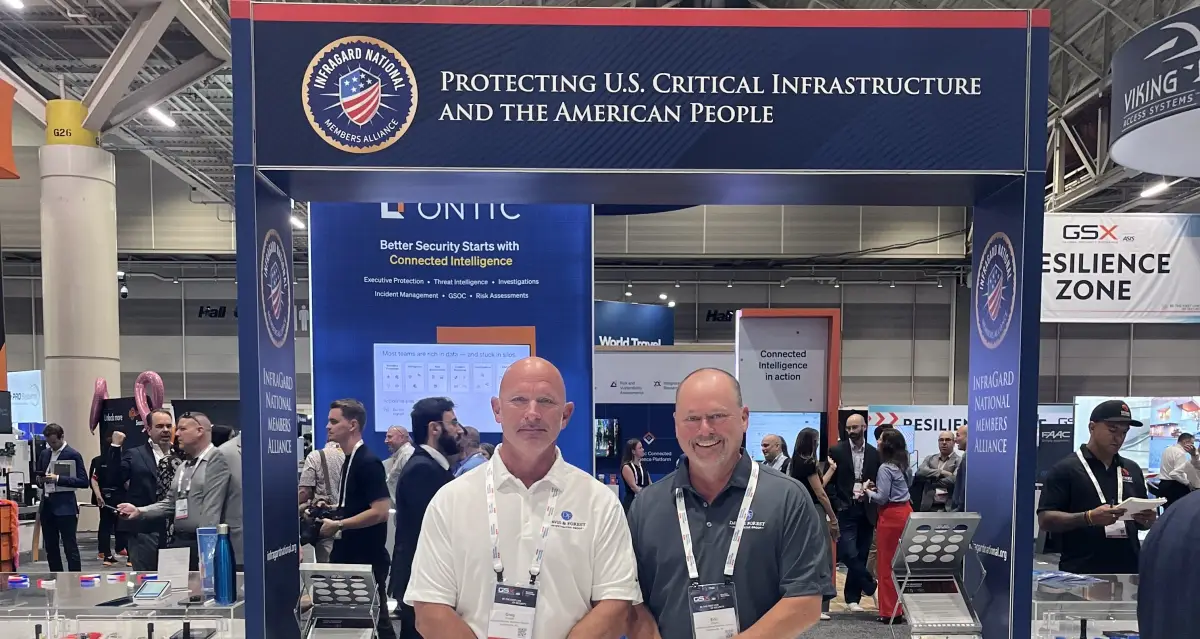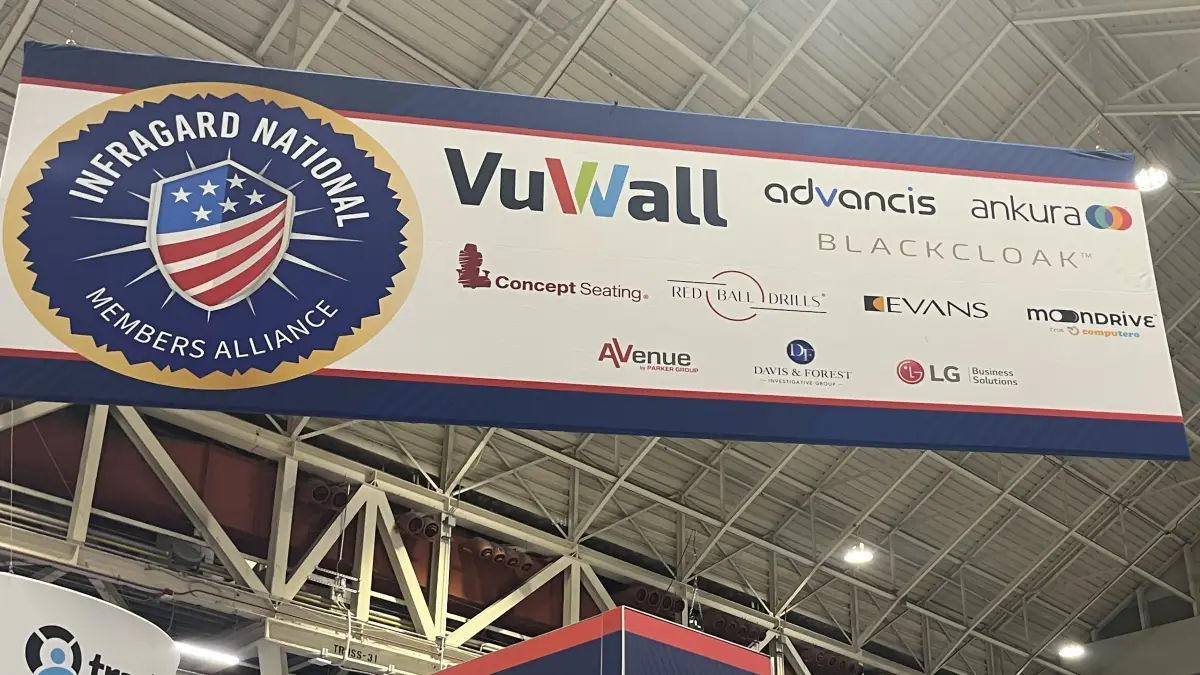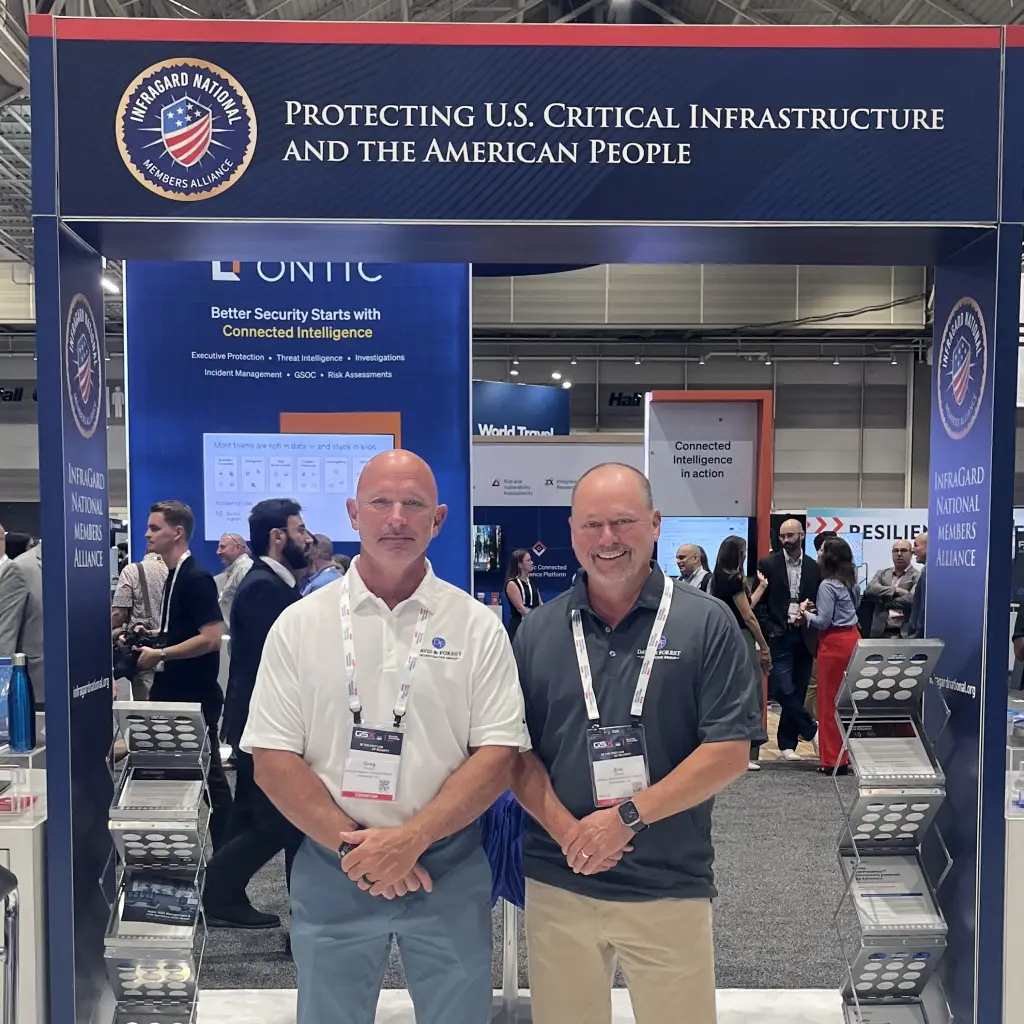GSX 2025: What 10,000 Security Professionals Are Talking About (And Why It Matters)

It is that time of year again.
We had the privilege of spending September 29 to October 1st in New Orleans at the Ernest N. Morial Convention Center for GSX 2025. The Global Security Exchange (GSX) is one of the largest and most important security conferences in the world.
Over 10,000 attendees. More than 500 vendors showcasing cutting-edge security solutions. The scale is hard to overstate.
We were there representing Davis & Forest, staffing a table for InfraGard National Members Alliance. InfraGard brings together critical infrastructure owners, operators, and law enforcement to share information about security threats and best practices. It was a chance to connect with Chief Security Officers, corporate security directors, and decision-makers from companies of all sizes who face the daily challenge of keeping people, property, and information safe.
But here's what struck us: In a room packed with corporate security professionals, we might have been the only private investigators in the building. That gave us a different view of things.

The Landscape: A Security Ecosystem Like No Other
Walking the GSX exhibit hall is an experience. The breadth of security solutions on display reflects just how complex modern security has become.
On one end, you have physical infrastructure vendors. Companies selling fencing systems, bollards, barriers, and vehicle-rated gates. These are the foundational elements of perimeter security. Modern bollards aren't just posts in the ground anymore. They're engineered systems that can stop vehicle-borne threats while looking good on a corporate campus.
A few aisles over, security guard service providers and uniform suppliers. Despite all the technology, human presence still matters. The conversations at these booths centered on staffing challenges, training protocols, and how to integrate people with technology platforms.
Then there's the technology section. And this is where things get overwhelming fast.
Command post displays showing walls of monitors. Access control systems promising seamless integration. Camera manufacturers touting 4K resolution and beyond. Data mining tools that promise to find patterns in terabytes of security data. Specialized detection systems for everything from gunshots to suspicious packages.
Throughout the exhibit hall, one theme kept coming up: artificial intelligence.
Every vendor booth, regardless of what they were selling, had the same pitch. "How can AI make this better?" It wasn't a question of whether AI belonged in security anymore. It was about how to leverage it effectively.
The Integration Problem Meets the AI Revolution
We heard the same challenge over and over from security professionals: they're drowning in options but starving for integration.
A medium-sized company might need cameras, access control, guard services, visitor management, threat monitoring, cyber protection, and emergency response planning. Each category has dozens of vendors, each with their own platform, their own data format, and their own promises.
The CSO's job isn't just to buy the best individual pieces. It's to make them all work together as a cohesive security strategy.
And that's before you factor in the time constraint.
We understand this. We hear about it from our security clients regularly.
Security isn't a full-time job. It's more than a full-time job.
These professionals are dealing with vendor selection, system implementation, staff training, compliance requirements, incident response, and strategic planning. All while the threat landscape evolves daily.
We understood this challenge before we became PIs. We understand it even better now.
Now, about AI. Because it really is changing everything.

GSX 2025 featured over 200 educational sessions covering everything from artificial intelligence to enterprise security risk management. But the AI conversation wasn't confined to conference rooms. It was everywhere.
Camera vendors were demonstrating systems that don't just record. They analyze.
Think about a retail environment. AI-powered cameras can now watch cash registers and flag unusual patterns in real-time. They notice when someone edits a transaction. They track when doors open and close. They count how many people are in a space at any given time and alert you to anomalies.
In access control, AI is fundamentally changing the game.
Traditional systems required keycards, badges, or biometric readers at every entry point. Modern AI-enabled camera systems can track who enters and leaves a building without anyone swiping a badge. They can detect when someone "piggybacks" behind an authorized person. They can flag when someone accesses an area they don't typically visit at a time that's unusual for them.
The camera industry has always been central to security. But it's experiencing the most dramatic transformation of any sector.
These systems can digest massive amounts of data that human security personnel simply cannot process. A camera network across a corporate campus might generate thousands of hours of footage per day. AI doesn't just store that data. It actively analyzes it for threats, patterns, and anomalies.
Gunshot detection systems are using AI to distinguish between actual gunfire and similar sounds. Fewer false alarms, faster response time.
Threat assessment platforms are using AI to correlate data from multiple sources and identify risks before they materialize.
But here's the catch. And this connects directly to an article we wrote for Pursuit Magazine about how convenience is security's biggest enemy.
Having the technology isn't enough.
You need to know it's properly configured, appropriately monitored, and actually doing what it's supposed to do. We're seeing companies invest heavily in AI-powered security systems without fully understanding their capabilities or limitations. Or worse, they implement sophisticated systems and then configure them for "convenience" rather than security. That defeats the entire purpose.
What This Means for You
Whether you're a corporate client managing security for your organization or an individual who needs investigation services, GSX reinforced something we already knew. The gap between technology and effective security implementation is real. And it's growing.
For corporate clients, the question isn't whether you should invest in advanced security technology. You probably already have.
The questions are:
Do your systems work together, or are you managing a dozen separate platforms?
Are they configured correctly for your specific threats and vulnerabilities?
Is anyone auditing whether they're performing as promised?
When something goes wrong, can you quickly determine what happened and why?
We don't sell cameras or access control systems. We evaluate whether what you have is actually protecting you. We understand the corporate security landscape because we engage with it. We attend conferences like GSX. We stay current on technology trends. And we bring that knowledge to your security assessment.
For our investigation clients, understanding corporate security infrastructure makes us better at what we do.
We know what modern cameras can capture and what they can't. We understand access control vulnerabilities. We speak the language of corporate security professionals, which matters when we're working with companies on internal investigations or litigation support.
The integration of AI into security systems also changes the investigation landscape. There's more data available than ever before. But accessing it, interpreting it, and presenting it effectively requires expertise in both investigation and technology.
Why We'll Keep Going to GSX
GSX isn't traditionally a private investigator's conference. But maybe it should be.
The line between corporate security tools and private investigation expertise is blurring. Companies increasingly need professionals who can bridge both worlds.
We went to GSX 2025 to stay on the cutting edge of security trends. Not because we sell these products, but because understanding them makes us better consultants and investigators. We can have more informed conversations with clients about their security needs. We can identify vulnerabilities that others might miss. And we can provide assessments that account for both current capabilities and emerging threats.
The security professionals we met at GSX are smart, well-funded, and dealing with real challenges. They're not looking for another vendor pitch. They're looking for trusted advisors who can help them make sense of a complex landscape and implement solutions that actually work.
That's what Davis & Forest Investigative Group provides.
Interested in how these trends affect your security posture? Whether you need a comprehensive security assessment, an investigation that leverages modern surveillance technology, or consultation on integrating your security infrastructure, we're here to help. Contact us to discuss how we can support your security and investigation needs.
Davis & Forest Investigative Group is a private investigation firm specializing in corporate security assessments, litigation support, and complex investigations. Learn more about our services at https://www.davisforestinvestigations.com
Recommended articles
Explore expert advice, industry trends, and case studies from our seasoned investigators. Stay informed with the latest updates in the world of private investigations and security.
Schedule a consultation
Ready to work with trained professionals who can uncover the truth and protect what matters most? Contact Davis & Forest Investigative Group today for trusted private investigator services. Our experienced investigators are ready to provide thorough, discreet, and results-driven investigations.
Your solution starts here
Davis & Forest Investigative Group's team is ready to help. Contact us today to discuss your case or request a consultation.




